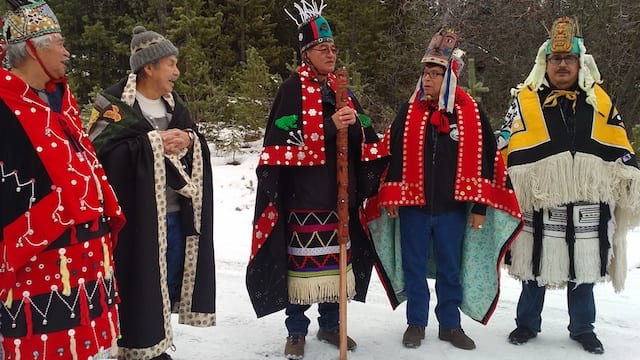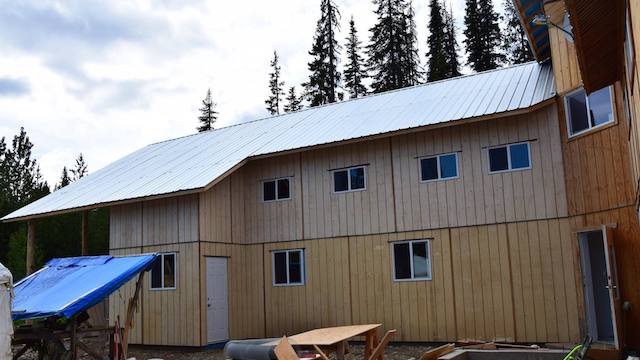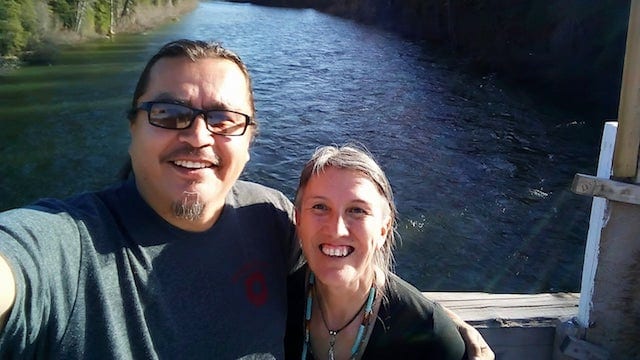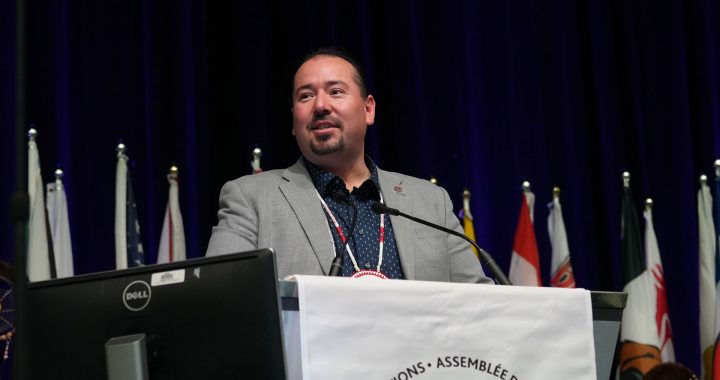
Hereditary chiefs of the Wet’suwet’en Nation say their territory and sovereignty are under attack by a pipeline company that’s turning to the courts for help in building a pipeline through unceded Wet’suwet’en lands.
But federal government documents obtained by APTN News reveal the odds may already be stacked against the Wet’suwet’en, and in particular the Unist’ot’en House of the Gilseyhu Clan, which the government regards as a risk to Canada’s “national interest” and one of its leaders an “aboriginal extremist”.
The documents, dated April 1, 2015 and marked “SECRET”, also reveal the government’s concern that ending the years-long Unist’ot’en resistance to pipeline development through their territory could trigger nationwide Indigenous-led protests.
Last week Coastal GasLink Pipeline Ltd., a subsidiary of Calgary-based energy company TransCanada, filed for an injunction with the Supreme Court of B.C. against the Unist’ot’en, whose members reoccupied parts of their traditional territory eight years ago.
The Unist’ot’en, who say they have the full support of the Wet’suwet’en hereditary chiefs, have until Dec. 10 to respond to the application.
The documents obtained by APTN come from the Government Operations Centre (GOC), an office of the Department of Public Safety that compiles information from other departments and police and intelligence agencies to identify potential threats to what the government regards as Canada’s national interest.
The 12-page report assesses the Unist’ot’en’s risk to the national interest as “Medium-Low”. A section titled “Impact on the National Interest” appears to offer details on this conclusion but is entirely redacted.
The report contains no expressed concern for the Unist’ot’en or discussion around whether the potential resource development on their territory poses a risk to their Indigenous rights.
The Unist’ot’en say the person referred to in the government document is not an extremist, but a hereditary chief.
They suspect Canada and the RCMP will try to portray them as potentially violent and as criminals if police are compelled by the provincial supreme court to remove the Unist’ot’en from their land.
Returning to the land
In 2010, after learning of various companies’ interest in transporting oil and gas through their territories to the B.C. coast, Wet’suwet’en citizens Freda Huson of the Unist’ot’en House and Smogelgem, Hereditary Chief of the Laksamshu Clan— who is also known as Warner Naziel—moved out on to their lands to build a camp, in part as a way to resist what they see as unauthorized encroachment on their territory.
Huson and Naziel are the two individuals named on Coastal GasLink’s injunction application, along with “Jane Doe” and “John Doe” and “persons unknown”.
What’s now widely known as the “Unist’ot’en Camp” has since become a home and a place of healing for Wet’suwet’en people, Smogelgem told APTN in a phone interview from Smithers, where he and other hereditary chiefs gathered last week to discuss the injunction, he said.
“That’s our permanent home and we’re planning on living out the rest of our lives there,” he said.
Smogelgem said moving from a nearby community and back onto their traditional lands has “become a way of life” for he and Huson and others who stay with them.
Watch Rob Smith’s 2016 APTN Investigates episode about the Unist’ot’en camp.
“We live off the land. We do a lot of trapping and hunting and fishing up there. We collect our medicines. We pick all the berries. We sustain ourselves primarily off of our territory, and that’s the way our ancestors were.”
In addition to it being their home, Huson and Smogelgem have overseen the construction, with the help of volunteers, of a three-storey healing centre where they house citizens of their Nation in need of support with addiction and other health issues.
Huson said the centre, which utilizes traditional Wet’suwet’en healing methods, has already provided shelter and healing for a family with five children, and currently has others staying there.

The Unist’ot’en Healing Centre prior to its completion. Unist’ot’en Camp/Facebook.
“The land itself contributes to speeding up the process of the healing — because they’re actually being reconnected to their homelands, and that actually helps in their healing.”
In recent years, as workers associated with Coastal GasLink, and previously the Northern Gateway pipeline—before that project was killed by the Trudeau government in 2016—attempted to access the Unisto’ot’en lands, Huson and others have repeatedly turned them away.
Huson said the Unist’ot’en have filmed the encounters for evidence of their people’s intentions and behaviour.
“We’ve always been peaceful and we’ve always been respectful,” she said. “It was their workers who haven’t been respectful…who go back and claim we threatened them.”
Indigenous rights and title Vs. Canada’s largest ever private sector investment
If built, the almost 700-kilometre Coastal GasLink pipeline would carry fracked natural gas produced by LNG Canada from just outside Dawson Creek in northeastern B.C. to a processing facility in Kitimat, where the gas would be liquefied and shipped to Asian markets.
The processing facility, pipeline and associated infrastructure are said to be worth a combined $40 billion, making the project the largest private sector investment in Canadian history.
In October, at an announcement that the pipeline would go ahead, Prime Minister Justin Trudeau said the LNG project, including the Coastal GasLink pipeline, “shows what’s possible when you collaboration and consult with Indigenous and local communities, when you coordinate all orders of government, and when people insist on economic, environmental and socially responsible development of our natural resources.”
In its court application Coastal GasLink says it has “entered into project agreements with all 20 elected Indigenous bands along the Project route, including five Wet’suwet’en Bands.”
The company says the Unist’ot’en “blockade is causing damage and irreparable harm.”
“It is not my problem that they didn’t follow proper business practice to ensure that the land you’re going to try to utilize, that you got permission from the title holders,” said Huson.

Smogelgem, hereditary chief of the Laksamshu Clan, and Unist’ot’en spokesperson Freda Huson say the Wet’suwet’en have never ceded their territories. Unist’ot’en Camp/Facebook.
“When you hear they have 100 per cent support from First Nations along this proposed pipeline route, those are elected bands and not one pipeline goes through those reserves where elected officials have jurisdiction,” Chief Na’Moks, hereditary chief of the Wet’suwet’en Tsayu Clan, told APTN in a phone interview.
“The territory itself—the jurisdiction there—belongs to the people and the hereditary chiefs and the names that we carry.”
The hereditary chiefs may have a strong case if they end up in court, according to Métis lawyer Bruce McIvor, who runs First Peoples Law in Vancouver.
“This is one of the huge outstanding issues now in Aboriginal law: who gets to speak for the Indigenous people? It’s one of the most difficult, thorny things to unravel as part of decolonization,” McIvor said.
“We have hundreds of Indian Act bands across the country and a lot of the time those bands may not align with the traditional governance [systems].”
The Wet’suwet’en, he explained, “have a very complicated governance system” compared to other Indigenous peoples.
“They have their various clans and houses and they’re quite numerous. And they don’t necessarily align with the Indian Act governance system.”
McIvor said the Unist’ot’en’s case is strengthened by the Supreme Court of Canada’s 1997 Delgamuukw decision.
“They’re not operating in a vacuum when it comes to Canadian law,” he says. “The Gitxsan and the Wet’suwet’en led extensive evidence about their governance systems as part of the Delgamuukw trial. It’s there, it’s on the record — how it works. And then of course how it’s very different than the Indian Act chief and council system.”
McIvor said if the provincial or federal governments want to “override” the Office of the Wet’suwet’en decision not to let the pipeline through their territory, “then they’re held to a very high [legal] standard in order to try and justify the entrenchment of title.”
TransCanada applied for an injunction and a civil lawsuit against Unist’ot’en Camp. They’re seeking an injunction & damages for “occupying, obstructing, blocking, physically impeding or delaying access” to our own unceded territory. Statement: https://t.co/S8FXB2SaiM #nopipelines pic.twitter.com/LnR8TwRjqg
— Unist’ot’en Camp () November 29, 2018
In its application the company said the project “is at a point where unimepeded access is now required to complete the work necessary to finalize execution plans and permitting, and continue with construction of the project.”
Without unimpeded access to the site, they say, “the project cannot proceed”.
“We will protect our lands as we see fit”
In its risk assessment report of the Unist’ot’en “blockade” the GOC regards the Unisto’ot’en camp as “the ideological and physical focal point of Aboriginal resistance to resource extraction projects.”
It also reveals government was aware TransCanada would pursue legal avenues to deal with the Unist’ot’en.
“TransCanada has signaled that it will seek a British Columbia Provincial Court injunction presumably to have the protesters and blockade removed,” the document reads, and that the injunction “is expected to be sought in April 2015.”
TransCanada, through Coastal GasLink Pipeline Ltd., finally applied for that injunction on Nov. 26.
In a statement posted on its website last Thursday, Coastal GasLink says its decision to seek the injunction against the Unist’ot’en “was not taken lightly,” and that “after years of attempting to engage the blockade to work through a solution, this step has become a last resort and a necessary action in our efforts to safely gain access to the area.
“As we have done in the past, we will continue to keep the lines of communications open to work towards a mutually beneficial outcome.”
The GOC document says if an injunction is enforced, “there is concern that violence could result.”
The government believes that “other groups may use this violence as a trigger to protest against other federal initiatives,” adding the protests could centre around other issues important to Indigenous people, including missing and murdered Indigenous women, the environment, and Bill C-51, the Harper government’s controversial 2015 anti-terrorism legislation.
Hereditary Chiefs of the Wet’suwet’en Nation in B.C. say LNG pipeline doesn’t have unanimous consent
Community on edge as LNG plans ‘man camps’ to start building gas pipeline
The feds believed at the time that the response to police enforcing the injunction could amount to “efforts to obstruct site access to pipeline companies, coupled with aggressive and threatening language, and potentially property damage to equipment.”
That prediction was “based on historical precedence, with confrontations occurring during 2014 between pipeline companies and protesters that resulted in the RCMP attending in order to keep the peace.”
Ultimately though, the GOC rated the “severity of those events…as LOW,” the document reads.
“Past assessments…suggest that these types of events are not highly functional due to a lack of the organization’s ability to garner the support of large groups. There is no indication that ongoing protests and blockades have been endorsed by local band councils or First Nation chiefs.”
Injunction coincides with government’s commitment to Indigenous rights framework
Huson believes the “aboriginal extremist” referred to in the report is Hereditary Chief Smogelgem, since Huson and Smogelgem are widely regarded as the camp’s leaders, and since the GOC reveals the gender of the individual it’s referencing.
In a written statement to APTN Public Safety Canada said it “cannot comment on matters before the courts,” but that “our government vigorously defends the rights of all Canadians to peaceful assembly and demonstration.”
The department says is “does not collect information about groups or individuals [and] relies on partner departments and agencies to provide analysis on threat assessments to the GOC.
The GOC in turn “compiles this information to identify potential impacts and to plan for whole of government consequence management response. Its job is simply to be aware of significant public events in case the Government is called upon to help.”

(The Unist’ot’en and Wet’suwet’en heredtiary chiefs say they will fulfill their duty to protect their territory from unwanted development. Kathleen Martens/APTN)
“Fulfilling these obligations should be a priority, as the United Nations has repeatedly urged,” he said.
After generations of colonization the Wet’suwet’en have finally “realized what we’ve lost,” said Huson.
“We’ve got only like 10 per cent of our traditional territory left,” she explained, citing municipalities, farming, mining, logging and other resource development that has encroached on her people’s lands.
“That’s why we’re grasping on to that 10 per cent so tightly right now, because our lives depend on it. We’re grasping on to it so we can practice our traditional ways of medicine, berry-picking, hunting, fishing.
“All these natural resources that are valuable to us you cannot replace.”
Chief Na’Moks said the hereditary chiefs “have banned pipelines in our territories in our house of parliament, and our people have supported that.
“We will stand to protect our territory.”











I support the Unistoten in their fight to defend their traditional territories. We need to get off fossil fuels asap and put our money into renewable energy projects. This so-called “Canada LNG” project is so wrong.
It is projected that the US will have no clean waterways in 2030. Why is “energy infrastructure” not impeded more by government? Why is it incumbent upon Native Peoples to be the only ones in the room giving dire warnings and therefore being labeled as “aboriginal extremists. ” Is it so ridiculous to stop fossil production in the day and age of Global Warming. People need to join the Native People and speak out more. What could be more important than the natural resources that keep us alive?
I support the Unistoten in their fight to defend their traditional territories. We need to get off fossil fuels asap and put our money into renewable energy projects. This so-called “Canada LNG” project is so wrong.
It is projected that the US will have no clean waterways in 2030. Why is “energy infrastructure” not impeded more by government? Why is it incumbent upon Native Peoples to be the only ones in the room giving dire warnings and therefore being labeled as “aboriginal extremists. ” Is it so ridiculous to stop fossil production in the day and age of Global Warming. People need to join the Native People and speak out more. What could be more important than the natural resources that keep us alive?
Contrary to what you’ve written here Unistoten do not speak for all Wetsuweten people. They aren’t the entire nation. Perhaps you should report more then just one side of the story. Immerse yourself a bit more before writing such one sided drivel.
Contrary to what you’ve written here Unistoten do not speak for all Wetsuweten people. They aren’t the entire nation. Perhaps you should report more then just one side of the story. Immerse yourself a bit more before writing such one sided drivel.
Excellent Article, thank you. We need responsible governance, not lip service to corporations. WE need to care for our environment, OUR province.
Please help find a candidate for the Nanaimo by-election, probably First Nations and female, that can stand up to Horgan and Weaver provided that they will agree to :
No LNG. No Kinder Morgan/Trudeau pipeline. No Site C. No additional old growth logging. Reduce and eliminate fish farms. Re-instate Agricultural Land Commission and enhance farming. Criminal charges for Mount Polley mining waste pollution.
If Horgan and Weaver don’t agree, then bring down the NDP/Green alliance and have a new general election.
We can no longer expect old systems to change; we need to create the new systems. If we don’t take action and elect a “real, and independent candidate” because we are afraid the Liberals will win the byelection, we will just continue with the present disasters.
Unceded Territory means no Treaty or loss of Indigenous Rights. It looks as if the Constitution is going to be challenged. Who is going to be so naive as to give away their land rights in the 21st Century? And more importantly, which Prime Minister will violate the recent signing of the United Nations Declaration on the Rights of Indigenous Peoples.
Excellent Article, thank you. We need responsible governance, not lip service to corporations. WE need to care for our environment, OUR province.
Please help find a candidate for the Nanaimo by-election, probably First Nations and female, that can stand up to Horgan and Weaver provided that they will agree to :
No LNG. No Kinder Morgan/Trudeau pipeline. No Site C. No additional old growth logging. Reduce and eliminate fish farms. Re-instate Agricultural Land Commission and enhance farming. Criminal charges for Mount Polley mining waste pollution.
If Horgan and Weaver don’t agree, then bring down the NDP/Green alliance and have a new general election.
We can no longer expect old systems to change; we need to create the new systems. If we don’t take action and elect a “real, and independent candidate” because we are afraid the Liberals will win the byelection, we will just continue with the present disasters.
Unceded Territory means no Treaty or loss of Indigenous Rights. It looks as if the Constitution is going to be challenged. Who is going to be so naive as to give away their land rights in the 21st Century? And more importantly, which Prime Minister will violate the recent signing of the United Nations Declaration on the Rights of Indigenous Peoples.
These people have undeniable rights to their ancestral lands and Canda and TransCanada are perpetrating genocidal violence in attempting to force their project. Wake up, Canadians! It is time to throw our support behind First Nations and assist them in protecting their lands.
In this way, we can right at least a few of the historical wrongs that have been perpetrated against them, prevent the acceleration of climate collapse, and live in right relationship with land and people’s.
Thanks for this excellent coverage. i was welcomed onto this unceded territory 4 years ago and I stand with these land protectors. I am hoping we can connect about a similar issue of logging in the Schmidt Watershed on Vancouver Island.
Canada’s ” Extreme Plutocratic ” government ‘s historical treatment of the FIRST PEOPLE Leave no option ‘s taken the fact that the rich take the resourses and exclude my people from benefiting ,
These people have undeniable rights to their ancestral lands and Canda and TransCanada are perpetrating genocidal violence in attempting to force their project. Wake up, Canadians! It is time to throw our support behind First Nations and assist them in protecting their lands.
In this way, we can right at least a few of the historical wrongs that have been perpetrated against them, prevent the acceleration of climate collapse, and live in right relationship with land and people’s.
Thanks for this excellent coverage. i was welcomed onto this unceded territory 4 years ago and I stand with these land protectors. I am hoping we can connect about a similar issue of logging in the Schmidt Watershed on Vancouver Island.
Canada’s ” Extreme Plutocratic ” government ‘s historical treatment of the FIRST PEOPLE Leave no option ‘s taken the fact that the rich take the resourses and exclude my people from benefiting ,
Thank you for your thorough and thoughtful coverage of this important issue. Canada is at a crossroads. If this fracked LNG project proceeds, there is no way that Canada can meet its commitment to reduce green house gas emissions. The Wetsuwet’en Nation finds itself right at the centre of this issue. But, it is the responsibility of all Canadians to stand up and stop this environmental disaster.
Thank you for your thorough and thoughtful coverage of this important issue. Canada is at a crossroads. If this fracked LNG project proceeds, there is no way that Canada can meet its commitment to reduce green house gas emissions. The Wetsuwet’en Nation finds itself right at the centre of this issue. But, it is the responsibility of all Canadians to stand up and stop this environmental disaster.